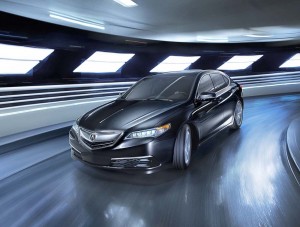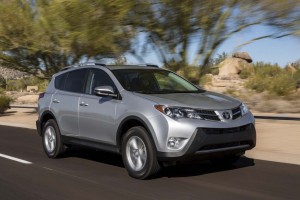
Ford sales were led, once again, by the F-150, but supported by the Fusion and Escape. The maker reported a 10% increase in July.
U.S. automakers enjoyed a strong sales month in July, but fell short of lofty analyst expectations. Toyota and Ford were the only makers to surpass predictions with increases of 11.6% and 10% respectively.
New car sales got a lift during July thanks to an improving economy, ample financing and the appeal of new products. Several companies posted double-digit sales increases, including Chrysler (20%), Nissan (11.4%), Subaru (27%), Mazda (17.1%), Audi (11.9%), Porsche (12.6%), Mitsubishi (21.4%), Land Rover (15%) and last, but not least, Maserati, which was up 315%.
“Incentive spending in July was above this year’s average, taking transaction prices down about one percent,” said John Krafcik, president of TrueCar. “Other than GM and Nissan, every full-line automaker increased incentive spending over last year. With growing discounts and low-interest financing readily available, it’s a great time to buy a car.”
In addition to beating the street’s expectations, Toyota had another reason to celebrate last month as it reported the highest retail volume of any auto company in the country with 215,802 units sold. Those figures include Lexus and Scion. Toyota division was up 10.6% for the month, helped by strong sales of the RAV4, which enjoyed its best month every, and Camry, which was up 15% in July. Lexus posted an 18.7% jump last month.
“Lexus dealers turned in their best July results ever thanks to some hot products, a nationwide marketing program and the strength of the overall luxury market,” said Jeff Bracken, Lexus group vice president and general manager. “Six of the eight Lexus models posted gains for the month.”
Overall, General Motors was the biggest vehicle seller, which lead to a 9% increase, but much of that was due to strong commercial fleet sales. It’s retail sales were up 4% for the month.
However, given the company’s issues with recalls, the results are still impressive. Much of that came from increases in crossover and sport-utility sales. Crossovers were up 26% in July while non-luxury SUVs rose nearly as much: 25%. The Chevy Tahoe led the way with a 52% increase and Cadillac Escalade was another big seller with sales up 32% in July.
Ford had its best July in eight years with a 10% jump that saw Ford and Lincoln posting gains in July. Escape and Fusion sold well, the company noted, and there was strong demand for new vehicles like the Transit Connect, Transit Connect Wagon and the Lincoln MKC.
Chrysler Group turned in a 20% increase compared with sales in July 2013. The Chrysler, Jeep, Dodge, Ram Truck and Fiat brands each posted year-over-year sales gains in July compared with the same month a year ago.
“Sales of the all-new Chrysler 200 mid-size sedan continued to increase while our Jeep and Ram Truck brands each turned in double-digit sales gains, helping to lead Chrysler Group to its 52nd-consecutive month of year-over-year sales growth,” said Reid Bigland, head of U.S. Sales.
The Jeep brand’s 41% increase was the largest sales gain of any Chrysler Group brand during July and its best-ever July sales. Chrysler Group extended its streak of year-over-year sales gains to 52-consecutive months in July.
In addition to Toyota, Asian automakers also posted solid sales last month. Nissan followed Toyota with an 11.4% increase. Kia noted a 6.7% while Hyundai reported a 2% increase, with the new Sonata accounting for most of that jump.

A slow rollout of the 2015 Acura TLX to dealer showrooms is blamed for a double-digit drop in the brand's sales last month.
However, Honda saw its sales fall 3.9%. Honda division sales were down 2.3% while Acura fell off more than 17%. Officials said Acura sales tailed off in July as dealers awaited the arrival of the new TLX sedan.
“Our July sales were definitely impacted by a lack of sedan availability as we sold out of TSX and TL,” said Mike Accavitti, Acura division senior vice president and general manager. “We’re confident that the all-new TLX luxury performance sedan, arriving at dealers now, will quickly remedy the situation and drive Acura sales growth through the second half of the year.”
(Auto sales jumping at banks loosen credit reins. For more, Click Here.)
Volkswagen Group sales were down 6% last month despite increases by Audi (11.9%) and Porsche (12.6%).
Volkswagen brand has struggled through much of 2014 and July was no exception with sales down 14.6%. Even its American-made Passat sedan also fell, 13.8% last month. VW’s sales for the year are down 11.7% through July. Fortunately, its premium brands, Audi and Porsche, enjoyed a strong July.
(Click Here for details Fiat shareholders approving merger with Chrysler.)
One of the reasons given for the increase in sales in 2014 is a rise in incentives. On the surface, it looks like that the average price paid for vehicles rose again. The analysts at Kelley Blue Book estimated average transaction price for light vehicles in the United States was $32,556 in July 2014. New car prices increased $662, or 2.1%, from July 2013.
“Overall, the industry continues to see average transaction prices rise at a solid pace,” said Alec Gutierrez, senior analyst for Kelley Blue Book. “Truck and utility vehicles are the major drivers behind this strength, especially among domestic automakers.
“Increasing share of luxury vehicles also has played a role as sales in that segment have led the growth in the overall industry so far this year. With consumer confidence on the rise in July, shoppers are clearly willing to spend a little extra on the vehicle they want.”
(To see what is America’s favorite car brand for “makin’ whoopee,” Click Here.)
However, when incentives are included, it’s a different story. The average transaction price for light vehicles in the U.S. was $30,636 in July 2014, down $368 (-1.2%) from July 2013, according to TrueCar.
Regardless, sales are expected to exceed 16.5 million in 2014 as low-cost, easier-to-get financing, rising home values and improving employment outlook continue to be the norm.
“Looking ahead, there is no sign that these fundamental drivers will change this year,” said Steven Szakaly, chief economist for the National Automobile Dealers Association. “Many consumers have delayed making a new-car purchase, and with the improving economy, they are now looking at trading up their cars for something newer.”
Earlier this year, he forecasted 16.4 million new-vehicle sales for 2014, a 5.8% increase from 2013, and next expects a rise to 16.77 million new vehicles in 2015.

